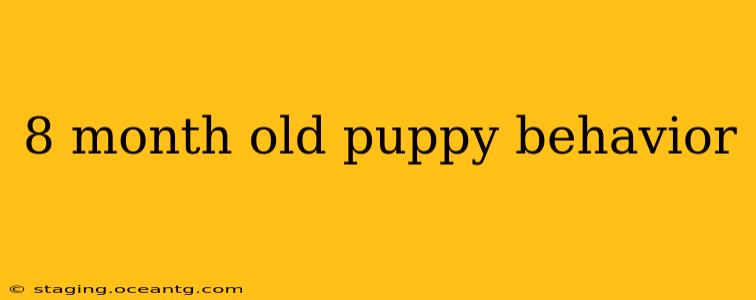An 8-month-old puppy is a fascinating creature! They're past the rambunctious puppyhood stage but haven't quite reached the calmer adulthood of a fully grown dog. Understanding their behavior at this age is crucial for successful training and a happy, well-adjusted canine companion. This guide will delve into common behaviors, potential issues, and how to best navigate this exciting phase of your puppy's life.
What is Normal Behavior for an 8-Month-Old Puppy?
At 8 months, your puppy is likely entering adolescence. This means a surge of hormones and a renewed burst of energy, sometimes accompanied by testing boundaries. You might see:
- Increased energy levels: Expect more zoomies, playful nipping (though hopefully less than before), and a general increase in activity.
- Testing boundaries: This is a crucial developmental stage. Your puppy will test your rules to see what they can get away with. Consistency is key here.
- Improved impulse control (but not perfect): While better than at younger ages, impulse control is still developing. Accidents might still happen, and they may still jump on people or counter surf.
- Socialization solidifying: The socialization you've provided so far is now taking root. However, continued positive exposure to different people, dogs, and environments is still vital.
- Developing independence: Your puppy will begin to show more independence, spending time alone more comfortably.
Why is My 8-Month-Old Puppy Suddenly Misbehaving?
This is a common concern for many owners. Often, the "misbehavior" is actually normal adolescent behavior. However, there are specific reasons why your puppy might be acting out more:
- Hormonal changes: The onset of puberty significantly impacts behavior. Increased testosterone or estrogen can lead to increased energy, assertiveness, and sometimes even aggression.
- Lack of consistent training: Inconsistent training or a lack of clear boundaries can lead to confusion and more challenging behaviors.
- Insufficient exercise: An energetic puppy who doesn't get enough physical and mental stimulation will find ways to release that pent-up energy, often in undesirable ways.
- Underlying medical issues: While less common, sudden behavioral changes can sometimes indicate a medical problem. Consult your vet if you're concerned.
How Much Sleep Does an 8-Month-Old Puppy Need?
An 8-month-old puppy still needs significant sleep. While the amount varies between breeds and individuals, they generally require 12-14 hours of sleep per day, spread out throughout the day and night. Ensure they have a comfortable, quiet place to sleep undisturbed.
Is My 8-Month-Old Puppy Too Old for Puppy Classes?
No, it's not too late! While puppy classes are ideal when puppies are younger, an 8-month-old can still benefit greatly from advanced obedience classes. These classes focus on refining basic commands and addressing adolescent behaviors. Many classes cater to older puppies and focus on socialization with other dogs of similar ages.
What are the Signs of an 8-Month-Old Puppy Needing More Mental Stimulation?
Boredom can lead to destructive chewing, excessive barking, or other unwanted behaviors. Signs of needing more mental stimulation include:
- Destructive chewing: Chewing on inappropriate items is a classic sign of boredom or frustration.
- Excessive barking or whining: Constant vocalizations can signal a need for attention or mental stimulation.
- Digging: If your puppy is digging holes in your yard excessively, this could also indicate boredom.
- Lethargy or restlessness: A puppy who is either excessively tired or constantly restless may not be getting the right balance of activity and rest.
How to Manage the Behavior of an 8-Month-Old Puppy
Consistent training, positive reinforcement, and plenty of exercise are key to managing an 8-month-old puppy's behavior:
- Consistent training: Continue with positive reinforcement training, focusing on commands like "sit," "stay," "come," and "leave it."
- Plenty of exercise: Provide daily walks, playtime, and opportunities for mental stimulation through puzzle toys or interactive games.
- Mental enrichment: Puzzle feeders, training games, and interactive toys keep them engaged mentally and reduce boredom.
- Create a safe and predictable environment: A safe space and routine help reduce anxiety and stress.
- Manage your puppy's interactions with other dogs carefully: Ensure appropriate socialization to avoid conflicts and build positive social skills.
- Consult a professional: If you're struggling, consider consulting a certified professional dog trainer or veterinary behaviorist.
This phase of your puppy's life presents both challenges and rewards. By understanding their behavior, providing consistent training and care, and seeking professional guidance when needed, you can help your 8-month-old puppy grow into a well-adjusted and happy adult dog. Remember patience and consistency are key!
